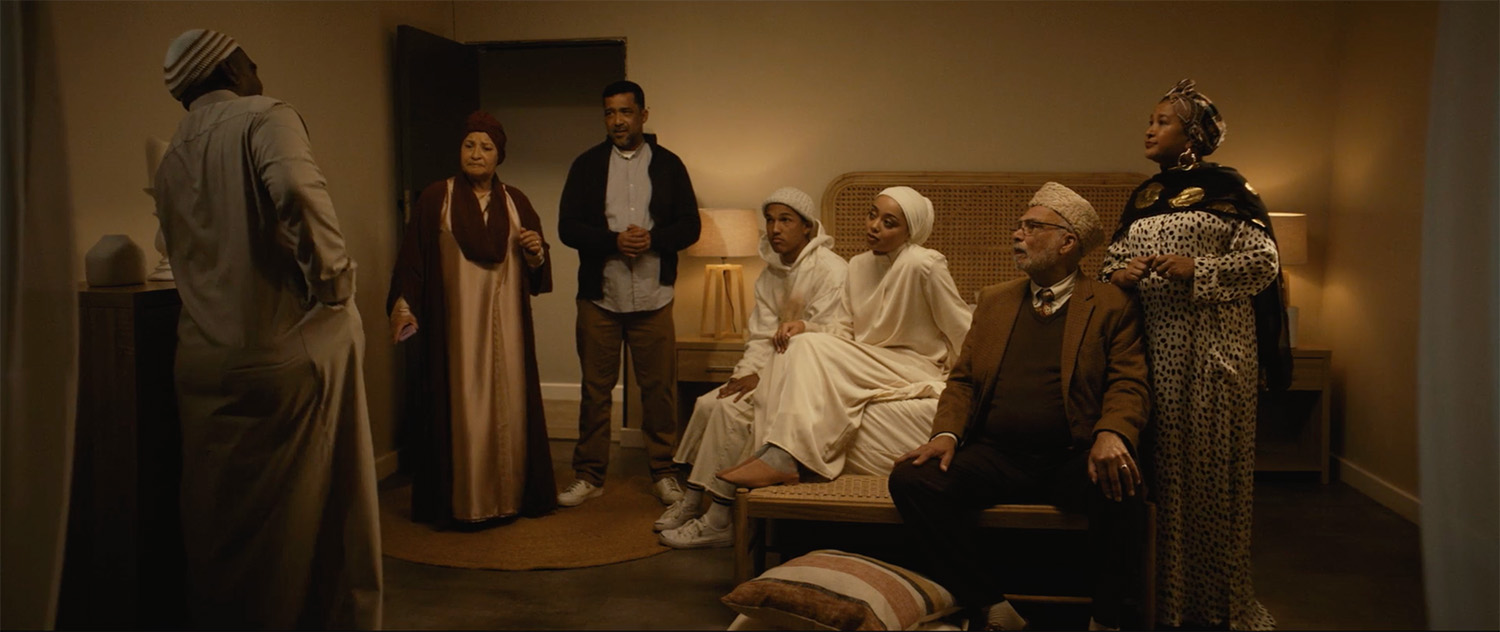
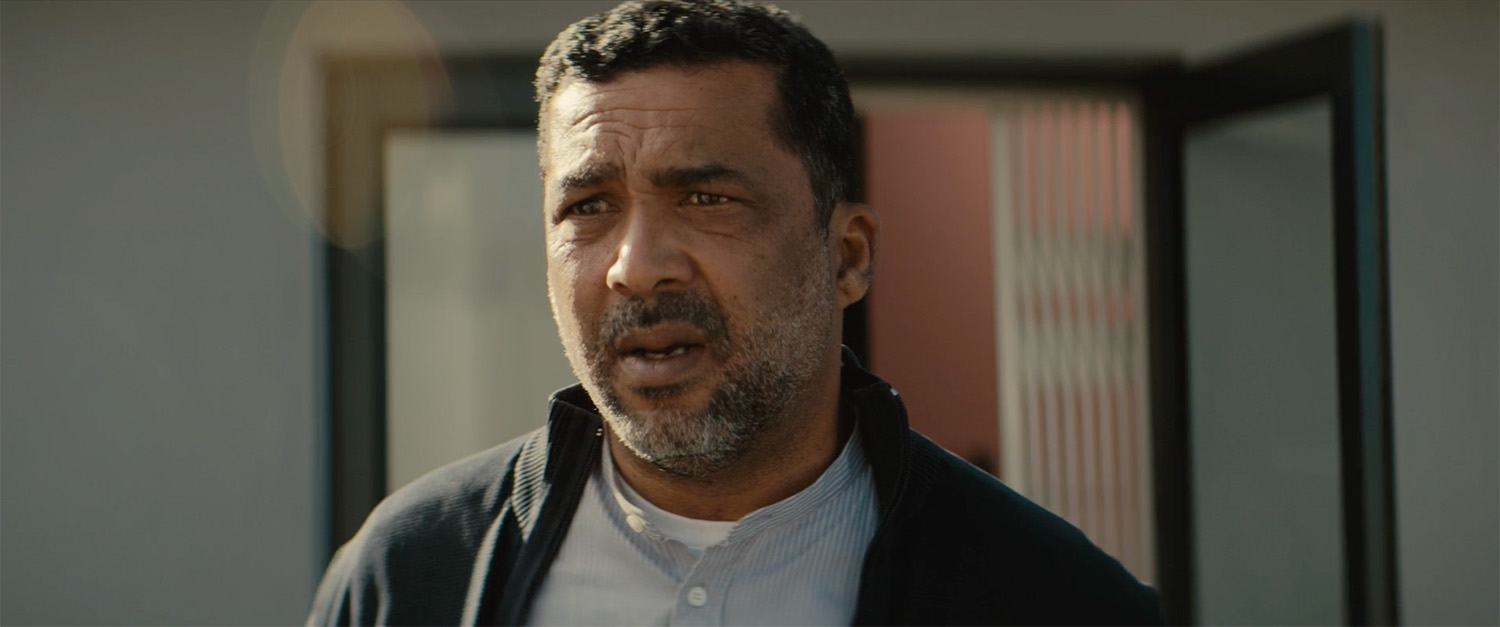
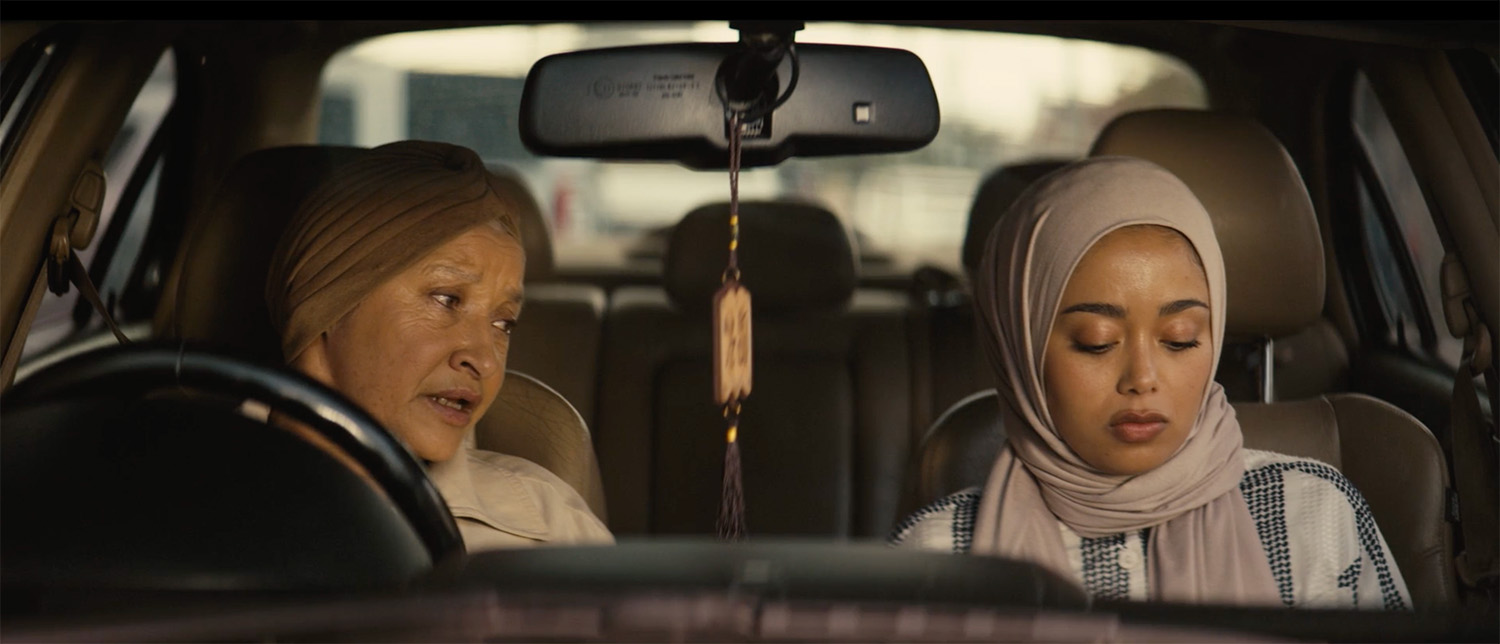
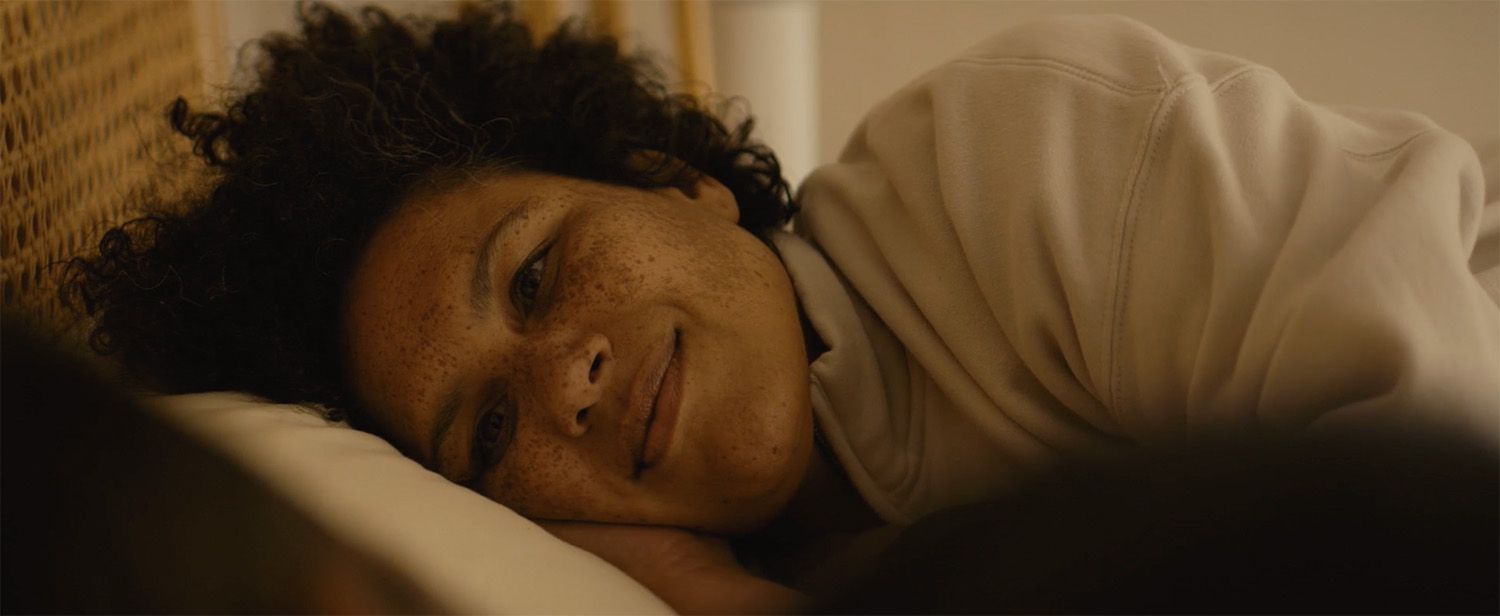
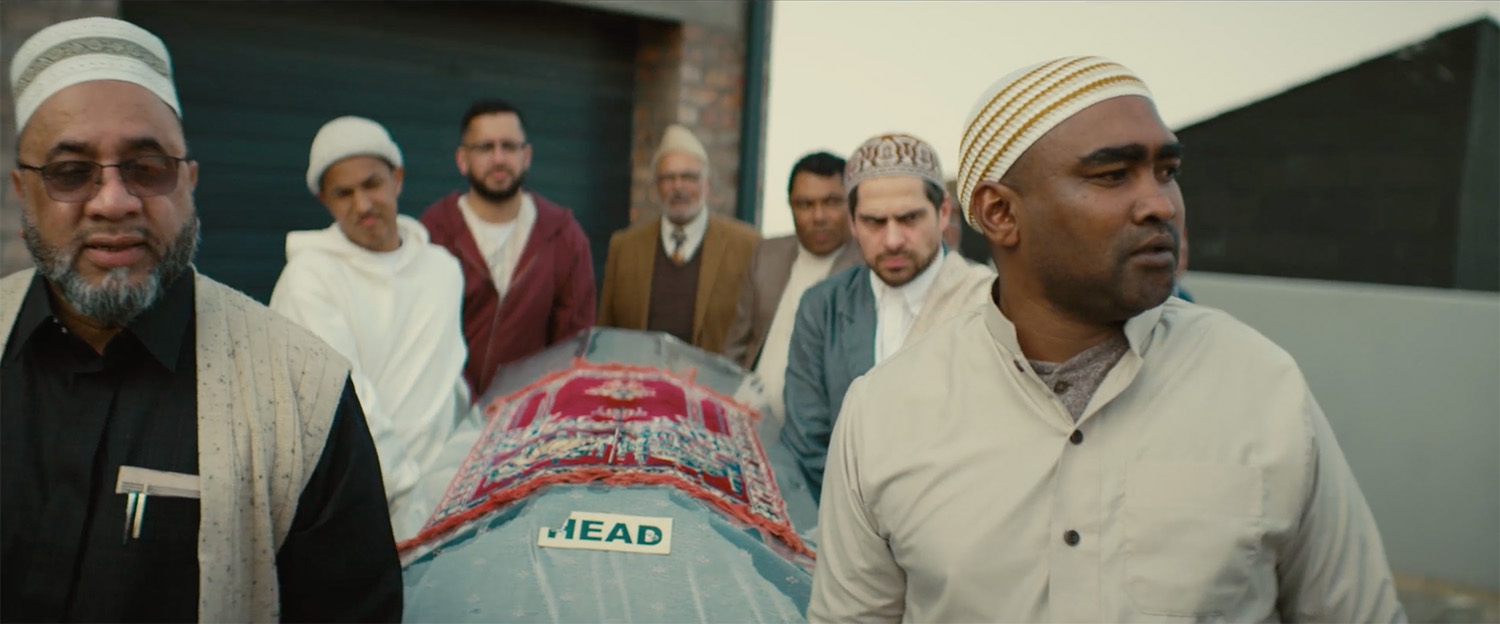
Feature film: Hier.Na
The Burgess family is a culturally blended South African family in the northern suburbs of Cape Town, on top of a hill, under a cross. Eric is secular, but his wife, Juleigha, who prefers to be called Julie, is a non-practicing Muslim. But when Julie dies of a heart-attack, her daughter Leila decides to arrange a janazah, a Muslim funeral, while her brother hides his grief by playing video games. Everyone must now navigate years of conflict and undercurrents within one tumultuous day, so Julie can be buried before sunset, as Muslim custom requires.
Writer, director, and actor Quanita Adams spoke about her feature film.
Where did the idea for Hier.Na (Hereafter) originate?
Hier.Na is a reflection on my own father’s janazah. Within the Muslim religion, we have to bury our dead on the same day they passed, before sunset. On the same day, before the sun goes down, there are hundreds of people in your home, and there’s food everywhere and things move so quickly. Having grown up in the Muslim community, I have attended many janazahs, but when it is one of your immediate family members, you get a new perspective on funerals, grief, family, and the way we hold each other in these moments.
The Muslim burial with its cultural practices is such a well-oiled machine, and I wanted the movie to speak to all the aspects of what it means to be involved in a Muslim burial, from all the complicated stuff, all the challenging stuff, to the things that make it beautiful, unique and quite special.
As a reflection on my father’s funeral, it was also an opportunity for me to unpack my thoughts, ideas and feelings around not just death, but specifically the way funerals are observed within my community.
The casting – as well as the acting – is faultless. How did you go about putting the cast together?
I wrote with certain people in mind – that’s my process when I write – but in instances where other people ended up in roles, there was such a natural gravitation to the ease of the script, which is always great for a writer. The combination of actors ended up being absolutely perfect.
Why did you decide to take on the role of Julie yourself, while also directing and having written the script?
I didn’t want to play the role, and I kept saying that we were going to cast for Julie. But I think that was a lie, and that I had written that role for myself! Dominique Jossie and Aisha Williams, the film’s producers, would tease me and say, ‘No, no, no! You always wrote yourself as Julie!’
I had written the character of Eric for David Isaacs, but we weren’t 100% certain that he was going to take the part, so I made this crazy bargain with myself that, if David agreed to play Eric, then I would play Julie. And then, of course, David said yes … But I think Dominique and Aisha were right, I was always going to play Julie.
Tell us about David as Eric. His performance is captivating – how much did he lean into his own experience versus your direction?
I was very lucky that I had the actors around to do table reads, and we also got to rehearse in the location for a whole week, which is an unusual luxury, but I wanted it to feel like the words were second nature.
Because I was an actor for 20-odd years, my style of directing leans quite heavily on collaboration. I like to think my directing is maybe not as dominant, it’s more collaborative so that actors can bring whatever it is that they bring to the room at that moment, and then we can work from there. For me, sticking to the script is not as important as telling the story. And I always say, ‘Forget the words, tell the story.’
I have known David since the 90s, and as a performer I’ve known him even longer. I have a lot of respect for him as a performer, and of course, the country knows and loves him through the many varied characters that he’s played on TV, the big screen and on theatre stages around the world. Because the bulk of David’s career has been dominated by comedy, Hier.Na, which is very different from the stuff he has mainly done, was such a great opportunity to share this other side of David’s performance muscle with an audience.
David has also lost his father, so in terms of being able to access those feelings of grief and loss, and the kind of overwhelming feeling when you’re inside that experience, it was something that I assumed he could draw and rely on. We spent a lot of time talking about it.
The film speaks to a varied audience – from people with an intimate knowledge of Muslim beliefs and practices to those with a very limited well to draw from. Was the relatability and relevancy of the film’s message something you intentionally addressed?
Yes, it was definitely intentional. We all die. The way we bury our dead is different, but at the heart of it, it’s universal. It’s about honouring the life that’s passed.
Half of my family is Christian, so this movie was also a way to say that these different communities have different approaches, and there’s something beautiful about them all. Sometimes, even cultural practices that seem alien, foreign or weird to you, are beautiful, special and important to someone else. So, I hope that people take that away from the movie.
This was a unique challenge because this isn’t a documentary. I wasn’t interested in teaching people about the janazah. But you must let people in and give them an opportunity to be vulnerable in their ignorance, to be curious and to have their vulnerability, their curiosity, met with gentleness. You don’t want to judge people for not knowing, but at the same time, this is not a docuseries, or a news insert on how Muslims bury their dead.
So, we had to find ways of using characters outside of the Muslim community in a way that felt natural and authentic. The best way to do that is to create characters that the audience can relate to. At the same time, Muslim people must also recognise themselves.
In the credits, the movie is dedicated to a long list of people. Who are they?
In many ways this is not just another movie for me; it is a reflection on grief and death, and particularly the passing of my father. Because so many people in the cast and crew had lost close family members, mothers and fathers, as recently as a couple of weeks before we started principal photography, it occurred to me that I wanted this movie to honour those people. It was important for me to hold space for those people, and I decided to have this in the memoriam scroll in the end credits. It was a chance to have the cast, crew and members of our production team dedicate the film to their loved ones.
What excites you about the South African film industry at the moment?
The young people who are coming up and telling stories. More and more, we are finding our distinctive South African narrative voice. The diversification of the industry is incredible. When I started my career, it was me and three other people who looked like me, and we certainly weren’t in decision-making positions.
And now, I’m looking around and there are a lot of people who look like me, and who don’t look like me, and that’s exciting. We’re bolder and braver with our stories. We are committing to telling stories that are authentically South African; we’re not just trying to replicate an American or British or Australian model. We’re realising that there’s a wealth of stories from within our own communities.
